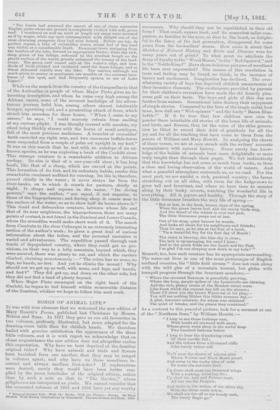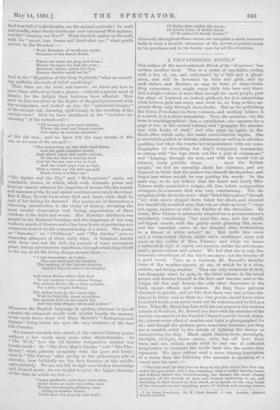SONGS OF ANIMAL LIFE.*
IT was with true pleasure that we welcomed the new edition of Mary Howitt's Poems, published last Christmas by Messrs. Nelson and Sons. In 1871 they gave us our old favourites in two volumes, profusely illustrated, but more adapted for the drawing-room table than for childish hands. We therefore hailed with genuine satisfaction the appearance of the three little volumes, and it is with regret we acknowledge that on closer acquaintance the now edition does not altogether realise this expectation. Why have we been deprived of the familiar original titles P Why have animals and birds and flowers been banished from one another, that they may be ranged in volumes apart; and why have we these sometimes in- correct and always needless foot-notes P If explanations were desired, surely they would have been better sup- plied. by the prose interludes of the original edition, rather than by such a note as that to "The Garden," where gillyflowers are interpreted as pinks. We cannot consider that the venerated volumes of 1834 and 1838 have yet any worthy • Sono of Animal Li.fn ; With the Birds; With the Flotenrx : PoirmA. By Mary Hewitt. With Ninety Illustrations by Glitoomolli. Thomas Nelson and Cons. 1880.
successors. Why should they not be republished in their old form ? That small, square book, and its somewhat taller com- panion, so familiar to the eyes, so dear to the heart, so delight- ful to the fancy of the last generation, disappeared for some years from the booksellers' stores. How came it about that
Sketches of Natural History and Birds and Flowers were for many years out of print P To what must we attribute the decay of loyalty to the "Wood Mouse," to the " Red Squirrel," and
to the" Nettle King?" Have those delicious pictures of woodland life been ever superseded? The causes of this revolution in taste and feeling may be found, we think, in the increase of luxury and excitement. Imagination has declined. The over- whelming variety of toys has deprived childish amusements of their inventive elements. The excitements provided by parents for their children's recreation have made the old homely plea- sures pall on their taste. The boys and girls of this day are further from nature. Sensational tales destroy their enjoyment of simple stories. Compared to the hero of the tragic serial, how tame, how dull are " Web-spinner " and the burly" Baron Blue- bottle !" If it be true that few children now care to ponder those inimitable old stories of the home life of animals, and birds, and flowers, then let the voice of the elder genera- tion be lifted to record their debt of gratitude for all the joy and for all the teaching that have come to them from the poems of William and Mary Hewitt. In analysing the charm of these verses, we are at once struck with the writers' accurate acquaintance with natural history. Never surely has know- ledge of the habits of animals been more delightfully or more truly taught than through their pages. We feel instinctively that this knowledge has not come so much from books, as from a close and loving observation of the world of nature. And what a peaceful atmosphere surrounds us, as we read. For the most part, we are amidst a rich, pastoral country ; the farms stretching out on all sides, with room for the hedge-rows to grow tall and luxuriant, and where we have time to saunter along by their bosky coverts, watching the wonderful life in everything. All is joyous and healthy. Through the story of the little dormouse breathes the very life of spring :--
" But at last, in the fresh, breezy days of the spring, When the green loaves bud, and the merry birds sing, And the dread of the winter is over and past, The little Dormouse peeps out at last.
Out of his snug, quiet burrow he wends, And looks all about for his neighbours and friends ; Then he says, as he sits at the foot of a larch, ''Tis a beautiful day for the first day of March!
The violet is blowing, the blue sky is clear; The lark is up-springing, his carol I hear ; And in the green fields are the Lamb and the Foal, I'm glad I'm not sleeping now down in my bole !'"
Remark, too, how each creature has its appropriate surrounding.
The water-rat lives in one of the most picturesque of English midland counties, his " little field stream " does not rush along with the wild glee of a mountain torrent, but glides with tranquil progress through the luxuriant meadows,-
" Where the crowned Bntomus is gracefully growing,
Whore the long, purple spikes of the Loosestrife are blowing, And the rich, plumy crests of the Meadow-sweet seem Like foam which the current has left on the stream;
There I'll show you the brown Water-rat at his play,—
You will see nothing blither this blithe summer day,— A glad, innocent creature, for whom was ordained The quiet of brooks, and the plants they contained."
As a contrast to this peaceful picture, look for a moment at one of the " Northern Seas," by William Howitt :-
" I long to see those icebergs vast,
With heads all crowned with snow, Whose green roots sleep in the awful deep Two hundred fathoms below.
I long to hoar the thundering crash Of their terrific fall ; And the echoes from a thousand cliffs Like lonely voices call.
. . . . . . . . . We'll pass the shores of solemn pine Where Wolves and Black Bears prowl. And away to the rocky isles of mist To rouse the northern fowl.
Up there shall start ten thousand wings With a rushing, whistling din ; Up shall the Auk and Fulmar start, All but the fat Penguin.
And there in the wastes of the silent sky, With the silent earth below,
We shall see far off to his lonely rock, The lonely Eagle go."
And how full of individuality are the animal portraits ! In craft and cruelty, what Border freebooter ever surpassed Web-spinner, and the " cuuniug red Fox P" What fiendish malice in the wolf, with his " gaunt, lean frame, and blood-shot eye ;" what gentle service in the Reindeer :-
" Meek Reindeer, of wondrous worth, Treasure of the desert North.
• • ..... • Where the skies are grey and droar ; Where 'tis night for half tbo year ; Reindeer, whore, unless for thee, Human dweller could not be."
And in the " Migration of the Grey Squirrels," what an absorb- ing, pathetic chronicle of tribal wandering !
Then there are the birds and insects : we know not how to leave them without at least a glance,—without a special word of thanks for the delight their histories have afforded. How have we lost ourselves in the depths of the good greenwood with the woodpecker, and looked up into the "splintered boughs" of the ancient oak, listening, spell-bound, to the croaking of the carrion crow ! How we have shuddered at the "ominous tu- whooing " of the screech-owl!—
" All among the yew-trees solemn,
Where the toad and lizard clamber Into many an ancient chamber,"
of the old ruin ; and we have felt the very breath of the sea, as we read of the sea-gull :-
" The waves leap up, the wild wind blows, And the gulls together crowd,
And wheel about and madly scream, To the sea that is roaring loud.
And let the sea roar over so loud, And the winds pipe ever so high,
With a wilder joy the bold sea-gull Bends forth a wilder cry."
" The Spider and the Fly," and " Web-spinner," again, are inimitable stories, in which, while with dramatic power and humour insects rehearse the tragedies of human life, the morals and manners of the fly and spider world are accurately described. But if Mary Hewitt loves every bird and beast, what shall be said of her feeling for flowers ? Her poems are iu themselves a charming introduction to the study of botany, revealing the most careful observation and loving appreciation of these children of the fields and woods. Mrs. Howitt's childhood was passed in the Midland Counties, and the happiuess of her long walks in search of flowers and of her busy hours of gardening was enhanced tenfold by the companionship of a sister. The poems on " Summer," on " Childhood," and " The Garden " give us charming glimpses of those early days. A botanical ramble with them was not the dull, dry pursuit of some uncommon plant, but an adventurous expedition, through which they drank iu the joy of all the living things around them :-
" 1 can remember, as to-day,
The corn-field and the reaping, The rustling of the harvest-sheaves, And the harvest-wain's up-heaping.
And every flower within that field
To my memory's eye comes flitting, The chicory-flower, like a blue cockade,
For a fairy-knight befitting.
The willow-herb by the water-side, With its fruit-like scent so mellow, The gentian blue on the molly hill, And the snap-dragon white and yellow."
Wherever the English language is spoken, wherever in far-off colonies the emigrant recalls with wistful loyalty the memory of his early home, there will Mary Howitt's " Buttercups and Daisies" bring before his eyes the very meadows of the dear Old Country.
We cannot conclude this sketch of the natural history poems without a few words upon some other characteristics. In " The Wolf," how the old Quaker indignation against war breaks forth ! In " The Poor Man's Garden " and " The Flax- flower," what genuiue sympathy with the poor and lowly ! And in " The Falcon," after giviug us the picturesque side of chivalry, how faithfully are the dark features of the middle- ages painted.) We are not left to sigh over broken drawbridge
and disused moat; we are taught to prize the higher blessings of the days in which we live :- " 0 gay goshawk, your days were when Came down at night the ruffian men To slay the sleeping children, then Lying in London Tower.
Yours were the days of civil feud ; Of Rufus slain within the wood; Of servile John, of Robin Hood, Of Woodstock's bloody bower !"
Above all, throughout these verses, we recognise a most reverent faith in God, a humble adoration of his power, a perfect trust in his goodness and in his tender care for all his creatures.







































 Previous page
Previous page